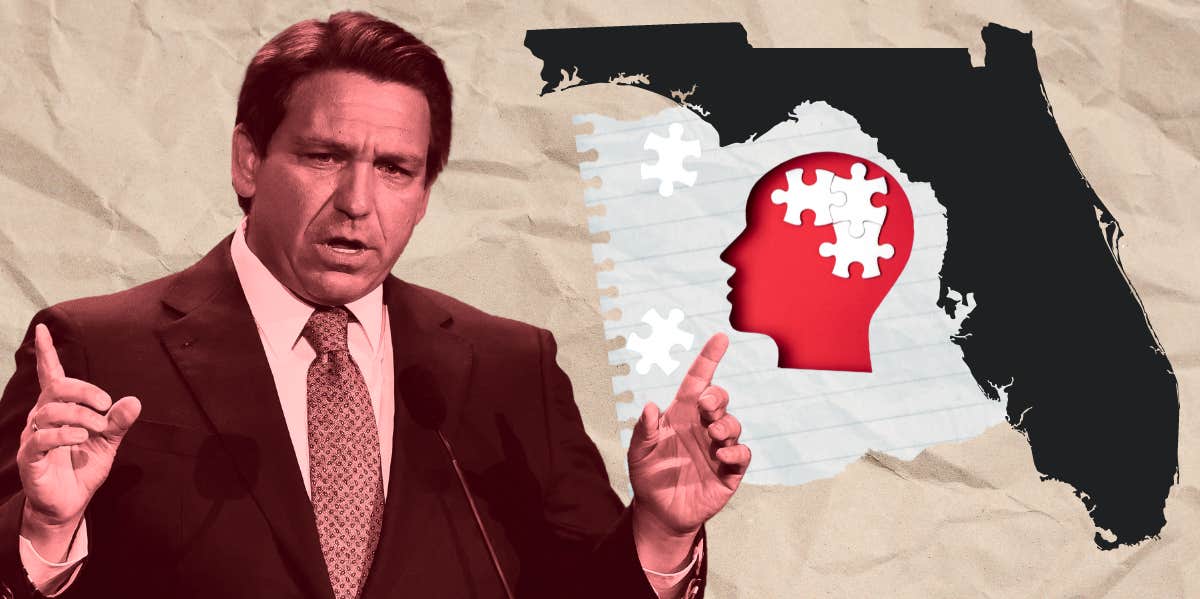What's Actually In The AP Psychology Course That's Causing It To Be Banned In Florida Schools
The curriculum is not as radical as Florida lawmakers believe.
 Oksana Vejus, GiruStudio, Denys Holovatiuk via Canva, Igor Y Eros / Shutterstock
Oksana Vejus, GiruStudio, Denys Holovatiuk via Canva, Igor Y Eros / Shutterstock Students in Florida are getting ready to start the school year, and they’re being denied access to learning one particular subject, due to state legislation.
As a direct result of Governor Ron DeSantis enacting Florida’s Parental Rights in Education Act, colloquially called the “Don’t Say Gay” law, schools have been “effectively banned” from teaching AP Psychology courses.
Florida’s Department of Education declared it illegal for AP Psychology classes to include any teaching on sexual orientation and gender identity. The College Board was informed by the Department of Education that school districts are only permitted to teach AP Psychology if they exclude the topics of sexual orientation and gender identity, which have been part of the course curriculum since its inception 30 years ago.
The AP Psychology course banned in Florida doesn't focus on radical definitions of sexual orientation and gender identity, adhering instead to status-quo characterizations.
There are nine units included in the AP Psychology course curriculum; each unit is broken down into topics.
Unit 6 covers Developmental Psychology, which includes 7 topics listed in the College Board’s AP Psychology Course and Examination Description. One of those topics is titled “Gender and Sexual Orientation,” with a defined learning target aimed to “Describe how sex and gender influence socialization and other aspects of development.”
The introduction to the Developmental Psychology section in the AP course description states that “Developmental psychologists seek to understand how changes in our biology and social situations over a lifespan influence our behaviors and mental processes.”
The CliffsNotes AP Psychology Cram Plan by Joseph M. Swope includes a section on Gender and Sexual Orientation. The included definition given of “gender orientation” on page 190 states that “gender orientation represents a person’s subjective ‘state of mind’ as masculine, feminine, or neutral... A person’s sex is biologically defined as male or female, whereas gender implies the psychological, behavioral, social, and cultural aspects of being male or female.”
“Gender roles are the patterns of behavior that men and women exhibit that are socially expected,” the book continues. “Gender identity is how a person thinks about himself or herself regardless of the sex role.”
The given definition of sexual orientation is “the unique emotional and sexual attraction toward another person — man, woman, or both.” The text continues, using the American Psychological Association’s explanation of sexual orientation, stating that “sexual orientation refers to ‘a person’s sense of identity — based on attractions, behaviors, and the membership in a community of others who share those attractions.’”
Florida’s attempt to legislate and limit the AP Psychology curriculum exhibits a fundamental disregard for learning, along with any nuanced understanding of the human condition.
As Arthur C. Evans Jr., the CEO of the American Psychological Association declared in a statement, “Understanding human sexuality is fundamental to psychology, and an advanced placement course that excludes the decades of science studying sexual orientation and gender identity would deprive students of knowledge they will need to succeed in their studies, in high school and beyond.”
Students in Florida are being barred from accessing the full depths of what education can offer them.
Cutting students off from acquiring any form of knowledge on the LGBTQ+ community's existence solely causes harm. Florida’s restrictive legislation is based on denying an inherent element of being human — different identities not only exist, they’re wholly valid, just as they are.
Alexandra Blogier is a writer on YourTango's news and entertainment team. She covers issues in the LGBTQ+ community, pop culture analysis and all things to do with the entertainment industry.

